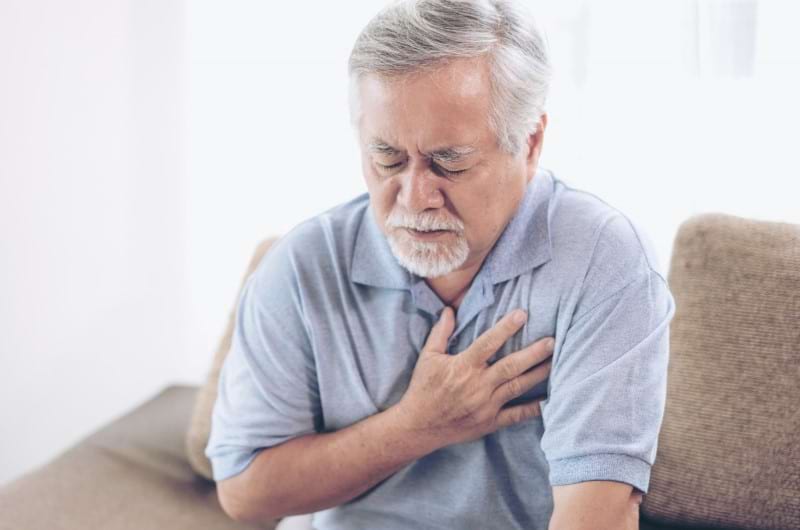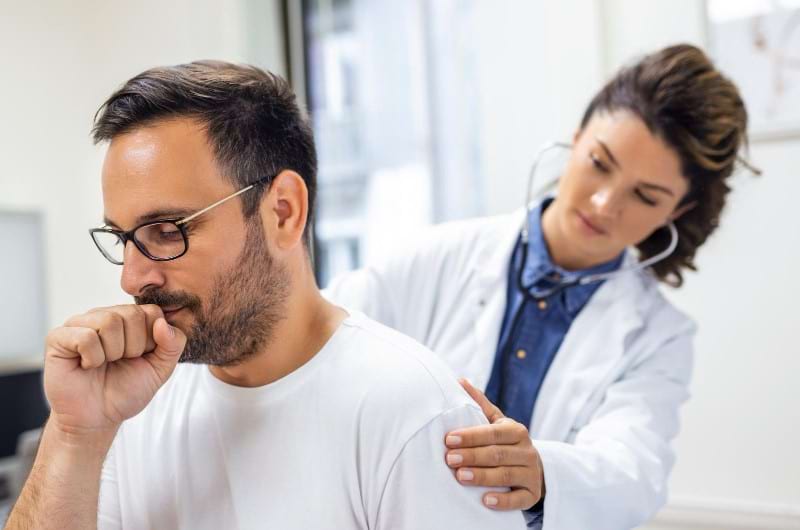There are many causes of chest tightness in the morning. It could be due to underlying heart-related issues, which could be an early sign of a heart attack. Lung and digestive problems may also play a role in giving you chest tightness in the morning. Sometimes, sleeping on your stomach or side may cause pressure on your chest, and even overexerting yourself for physical activity may result in chest discomfort the following day.
Waking up with a tight chest every morning can be pretty alarming. If you experience this, you might wonder about the worst possible causes.
Could it be your heart? Is it a sign of a heart attack? Should you go to the hospital?
There are a lot of possible causes for your experiencing chest tightness in the mornings.
Most of them may cause you to worry about your health, but it could just be as simple as a problem with your sleeping position.
Below are possible causes of experiencing chest tightness in the morning.
Heart-related problems

1. Coronary artery disease (CAD)
CAD is the most common fatal heart disease worldwide. It affects millions of people, particularly in the United States.
This condition is also known as coronary heart disease or ischemic heart disease.
It occurs when fatty material, cholesterol, and substances (plaques) slowly build up in the blood vessels that supply nutrients and oxygen-rich blood to your heart (coronary arteries).
This results in restricted blood flow, which causes symptoms like:
- Chest pain (angina) or any chest discomfort, pain, or tightness.
- Breathlessness
- Fatigue
- Lightheadedness
- Nausea
- Cold sweats
- Palpitations
- Heart attack
Some people experience having a heart attack as a first sign of CAD. A heart attack happens when your blood vessels become completely blocked.
Are you at risk?
There are various risk factors of CAD, which include the following:
- Overweight or obesity
- Inactivity
- Unhealthy diet
- Smoking
- High blood pressure
- High cholesterol
- Family history
- Age
- Stress
- Men are at greater risk than women
If you have a family history of suffering from CAD and you are prone to the risk factors, see your doctor for an assessment immediately.
2. Angina
When you have CAD, you may experience episodes of chest pain or discomfort, which is called angina.
Angina is often described as a feeling of pressure, squeezing, heaviness, or pain in the chest. The pain may radiate to your arms, neck, jaw, shoulder, or back.
When you exert yourself, it triggers angina, especially if you have clogged arteries or blood clot problems. However, it may also occur when you’re at rest or in the early mornings.
Your heart rate and blood pressure typically rise in the early mornings, triggering angina, especially if you have underlying heart issues that result in experiencing chest discomfort as soon as you wake up.
The risk of experiencing angina increases with age, but it can start at an early age and commonly occurs in adults over 45 years old.
What can you do?
- Pay attention to your triggers. If you experience chest pain or discomfort due to exercising, emotional stress, eating a heavy meal, or exposing yourself to extreme cold or hot temperatures, it could be angina. Other triggers may include drinking alcohol, smoking, and taking certain medications.
- Take rest and medication. Angina typically goes away within approximately 15 minutes of rest and medication. If it lasts longer than that, seek medical assistance immediately.
3. Myocarditis
Myocarditis occurs when your heart muscle (myocardium) becomes inflamed due to viruses, bacteria, toxins, certain drugs, Autoimmune diseases, etc.
You may experience chest pain due to myocarditis, which would feel like a dull, aching pain or pressure in your chest that may worsen when lying down or during activity.
Below are some other symptoms:
- Shortness of breath
- Fatigue
- Palpitations (feeling like your heart is racing or skipping beats)
- Cough
- Swollen feet and ankles
- Lightheadedness or dizziness
- Fainting
When myocarditis becomes severe, it can damage your heart muscles, leading to heart failure, heart attack, stroke, and sudden death.
4. Pericarditis
Pericarditis occurs due to inflammation of the thin, sac-like tissue surrounding your heart.
One of the most common symptoms of pericarditis is a sharp and stabbing chest pain, which often worsens when lying down or taking a deep breath. It may also radiate to the neck, shoulders, and back.
Other symptoms of pericarditis may include:
- Shortness of breath
- Palpitations
- Cough
- Fever
- Weakness and tiredness
- Night sweats
- Swollen feet and ankles
- Difficulty swallowing
5. Endocarditis
It occurs when there’s an inflammation of the inner lining of your heart, known as the endocardium.
When you have endocarditis, you’re most likely to experience chest pain in the morning because your heart is working harder to pump blood, which can put extra strain on your inflamed endocardium.
6. Heart attack
A heart attack happens when the supply of oxygen-rich blood and nutrients to a part of your heart muscle becomes blocked. When treatment is delayed, it will cause damage to your heart muscle, causing it to die slowly.
Coronary artery disease (CAD) is the most common cause of a heart attack.
Consult your doctor immediately when you experience symptoms of a heart attack.
The most common symptom of a heart attack is chest pain that feels like tightening, crushing, or squeezing pain in the center of your chest.
It may spread to your shoulders, arms, neck, jaw, teeth, back, or upper belly. It may last for a few minutes or go away and then come back.
The pain may worsen when you move yourself or lie down.
Other symptoms of a heart attack may include the following:
- Weakness
- Feeling cold and sweaty
- Shortness of breath accompanied by chest pain
- Nausea or vomiting
- Lightheadedness or dizziness
- Fainting
Please immediately call 911 or your emergency hotline if you experience these symptoms.
Heart attacks can happen anytime. It can occur in the morning because your blood pressure naturally rises to help your body wake up.
If you’re suffering from a blocked blood vessel or CAD, high morning blood pressure increases your risk of a heart attack.
You must constantly monitor your blood pressure, especially in the morning when you experience chest pain or discomfort.
What can you do while waiting for help?
If you think you’re having a heart attack, below are things you can do while waiting for help to arrive:
- Don’t attempt to drive yourself to the hospital. Don’t hesitate to call someone nearby when no emergency services are available.
- Sit or lie down to rest and relax.
- Take as many deep breaths as possible until you feel calm.
- Loosen your buttons or any tight clothing.
- Take nitroglycerin as directed by your doctor.
- Take aspirin only when recommended by your medical provider or emergency responder. Take note that aspirin can cause allergies or interact with other drugs.
7. High blood pressure
Your blood pressure is at its highest in the morning because it naturally rises to help you wake up.
Moreover, your blood vessels are typically narrower in the morning, which also causes your blood pressure to rise. As a result, your heart works harder to pump blood into the rest of your body, resulting in chest pain.
High blood pressure is a common heart disease and a leading cause of preventable death in the United States. You might have heard of it as a “silent killer” because it often doesn’t show any symptoms.
Have your blood pressure checked regularly at home or in your local clinic.
Respiratory diseases

1. Pneumonia
When bacteria, viruses, or fungi infect your airways and the tiny air sacs (alveoli) in your lungs, it results in swelling and inflammation.
It irritates the nerves in your lungs, making it difficult for you to breathe, and causes chest pain and tightness.
These symptoms may worsen in the morning because your lungs may adjust to breathing more deeply as you wake up.
Pneumonia may also cause fluid or mucus buildup in your lungs, which could be thicker in the morning, making it more difficult to cough and causing your chest to feel tighter.
You must see a doctor when you suspect having pneumonia to receive treatments and prevent further lung complications like lung abscess and respiratory failure.
Below are things you can do to alleviate chest tightness due to pneumonia:
- Sit up straight or stand up to help open up your airways and make it easier for you to breathe.
- Take slow, deep breaths to relax your muscles and relieve tightness.
- Use a humidifier or take a hot shower to help loosen mucus.
- Drink plenty of fluids to help thin mucus.
- Take over-the-counter cough medications as directed by your doctor to relieve coughing and chest tightness.
- Get plenty of rest to help your body to fight off the infection.
- Take your antibiotics as prescribed to treat your pneumonia and relieve your symptoms.
2. Bronchitis
Most of the time, bronchitis occurs after a cold or the flu.
It occurs when bacteria or viruses infect the two tubes that carry air in and out of your lungs, resulting in airway inflammation. It narrows the air’s path, resulting in difficulty breathing and chest tightness.
Here are some tips that may help to relieve chest tightness in the morning due to bronchitis:
- Avoid sleeping on your back. It can make it more difficult to breathe and can worsen chest tightness. Try sleeping on your side or stomach instead.
- Elevate your head when you sleep. It will help to keep your airways open and can reduce chest tightness.
- Avoid smoking and secondhand smoke. Smoking can irritate your airways and worsen chest tightness.
- Manage stress. Stress can worsen chest tightness. Try relaxation techniques such as deep breathing or meditation.
3. Pulmonary embolism
When blood clots in one of your lungs’ large blood vessels (pulmonary arteries), depriving it of nutrients and oxygen-rich blood, it results in a life-threatening lung condition called pulmonary embolism (PE).
It can cause you to experience shortness of breath and chest tightness that may feel like a heart attack.
4. Pulmonary hypertension
When high blood pressure affects your pulmonary arteries, it’s known as pulmonary hypertension.
It can cause the blood vessels in your lungs to narrow, making it difficult for blood to flow, and causes your heart to work harder to pump the blood through, resulting in chest pain or tightness.
5. Collapsed lung
When air leaks into the space between your lung and chest wall, it puts pressure on the outside of your lung, preventing it from expanding, which causes it to collapse.
This condition is also known as pneumothorax.
Chest tightness is a common symptom of a collapsed lung. You may also experience pain on one side of your chest.
Small collapses may heal on their own and will only require you to rest and avoid strenuous activity.
Larger collapses will need medical procedures to remove excess air. If an underlying lung disease is causing your collapses not to heal or to recur, you may need to receive surgery.
Gastrointestinal causes

1. Heartburn
A burning sensation in the center of your chest (heartburn) is a common symptom of acid reflux or gastroesophageal reflux disease (GERD).
It happens when stomach acid flows back into your esophagus, a tube connecting your throat to your stomach.
The stomach acid may irritate the lining of your esophagus, causing the muscles to spasm, making it difficult to breathe, and also causing chest tightness.
2. Pancreatitis
A swollen and inflamed pancreas may press against your diaphragm, the muscle that separates the chest from the abdomen.
It can cause difficulty breathing and chest tightness.
Pancreatitis may also cause your pancreas to produce digestive enzymes that can irritate the lining of your esophagus and airways, contributing to chest tightness.
3. Peptic ulcer
Peptic ulcers refer to open sores on your stomach lining or small intestine caused by stomach acid and digestive juices.
These sores may cause a burning sensation in your abdomen extending to your chest.
Other symptoms of peptic ulcers include the following:
- Upper abdominal pain
- Burning sensation in the stomach
- Heartburn
- Sour taste in the mouth
- Nausea and vomiting
- Bloating and belching
- Loss of appetite
- Unexplained weight loss
- dark, bloody stools
Other potential causes
1. Muscle strain
You may experience chest tightness as a result of muscle strain. Muscle strain happens when a muscle is stretched beyond its limit, torn, or overused.
It can occur when you lift heavy objects frequently or suddenly or engage in strenuous activities like exercising. Muscle strain can also occur from repetitive work or hobby movements.
Below are a few ways in which muscle strain causes chest tightness in the morning:
Sleeping position

Sleeping on your stomach or your side with your arm under your pillow will put pressure on your chest, which causes the muscles to tighten during sleep.
Below are some sleeping positions you may want to practice to avoid chest tightness:
- Elevate your upper body using a wedge pillow or an inclined bed. It will help reduce the risk of acid reflux or GERD.
- Sleep on your left side with your head elevated slightly. It will reduce pressure on your chest and improve blood circulation. If you experience angina, this sleeping position is very suitable for you.
- Lie on your back while slightly elevating your upper body with a pillow behind your back, and bend your knees. It will open airways and reduce pressure on your chest. This position is beneficial when you suffer from asthma or breathing difficulties.
- Sleep on your back and use a pillow that supports your neck and head. Also, place one underneath that will help your back. This position will be beneficial if you have chest or lung issues.
You may experiment with different positions to find which suits your health condition and makes you most comfortable.
If chest tightness doesn’t disappear after testing different sleeping positions, you should see your doctor immediately.
Soreness and inflammation due to previous activity
When you perform actions that have strained your chest muscles the day before, they may feel sore and tight in the morning.
If these activities have caused injury, it will lead to swelling and pain. The symptoms may worsen because your muscles have had time to rest and inflame at night.
Below are some tips to avoid soreness and inflammation before and after performing an activity:
- Make sure to warm up and cool down.
- Drink plenty of fluids.
- Gradually increase the intensity and duration of your workouts.
- Use correct form and technique when exercising.
- Give your body time to rest and recover between exercises.
- Get 7-8 hours of sleep.
- Cold compress for swelling and a hot compress for sore muscles.
- Eat a healthy and balanced diet rich in anti-inflammatory foods.
- Watch out for symptoms of chest tightness after physical activity.
- Consult your doctor for anti-inflammatory medicines.
Muscle spasms
When your chest muscles suddenly contract, these are episodes of muscle spasms.
They are usually caused by dehydration, fatigue, pain, inflammation, stress, and vitamin and mineral deficiency.
Muscle spasms in the chest can cause tightness.
Below are tips to prevent muscle spasms:
- Drink enough amount of fluids every day.
- Eat a balanced diet rich in nutrients like potassium, calcium, and magnesium.
- Remember to fill in your electrolytes by drinking a sports drink or supplements, especially on hot days or when exercising.
- Always warm up and stretch before and after doing a physical activity.
- Maintain a proper posture during your daily life activities.
- Get regular massages, strength training, and exercise.
- Learn to manage stress.
2. Anxiety
Waking up with a tight chest could be due to anxiety. It’s because anxiety triggers your body’s flight-and-fight response, which causes you to experience physical symptoms.
In the morning, your body naturally releases a hormone called cortisol, which helps your body to wake up and be alert.
Cortisol is a stress hormone that causes your heart rate to increase and your blood vessels to constrict.
When you have anxiety, your body tends to release very high levels of cortisol, leading to a feeling of chest tightness.
Anxiety can also cause muscle tension in your chest, which puts pressure on your heart and lungs, resulting in difficulty breathing and chest tightness.
Another common physical symptom of anxiety is shallow breathing, leading to hyperventilation, which causes chest tightness, shortness of breath, and lightheadedness.
3. Covid-19
Viral infections like COVID-19 may cause chest tightness. Other common symptoms of COVID-19 may include the following:
- Fever or chills
- Dry cough
- Shortness of breath or difficulty breathing
- Muscle or body aches
- Sore throat
- Congestion or runny nose
- Nausea or vomiting
- Diarrhea
- Loss of taste or smell
If you experience the following symptoms and chest tightness, please get yourself tested for the virus and isolate yourself to prevent the spread of the virus.
Persistent pressure, pain, discomfort in your chest, and other symptoms like trouble breathing, blue-colored skin, lips, or nail beds, and trouble staying awake or persistent drowsiness are a few signs of severe complications from COVID-19.
Please call emergency help immediately when you notice these symptoms.
References
- https://www.healthline.com/health/tight-chest#other-conditions
- https://www.health.com/chest-tightness-7370909
- https://www.medicalnewstoday.com/articles/waking-up-with-chest-pain
- https://www.mayoclinic.org/diseases-conditions/coronary-artery-disease/symptoms-causes/syc-20350613
- https://my.clevelandclinic.org/health/diseases/21489-angina
- https://www.mayoclinic.org/diseases-conditions/heart-attack/symptoms-causes/syc-20373106
- https://www.healthline.com/health/heart-attack
- https://www.healthline.com/health/pneumonia
- https://my.clevelandclinic.org/health/diseases/15304-collapsed-lung-pneumothorax
- https://www.healthline.com/health/peptic-ulcer
- https://www.livehealthily.com/health-library/symptoms/chest-tightness
- https://www.verywellhealth.com/best-and-worst-sleep-positions-for-health-conditions-4158271
- https://www.verywellhealth.com/chest-tightness-5176641


